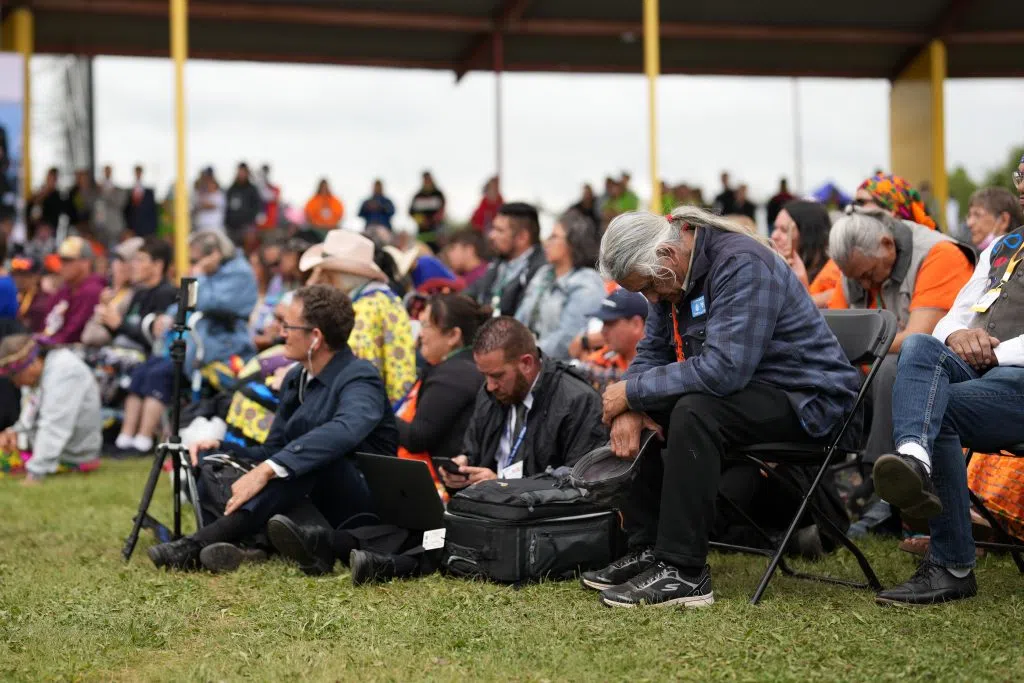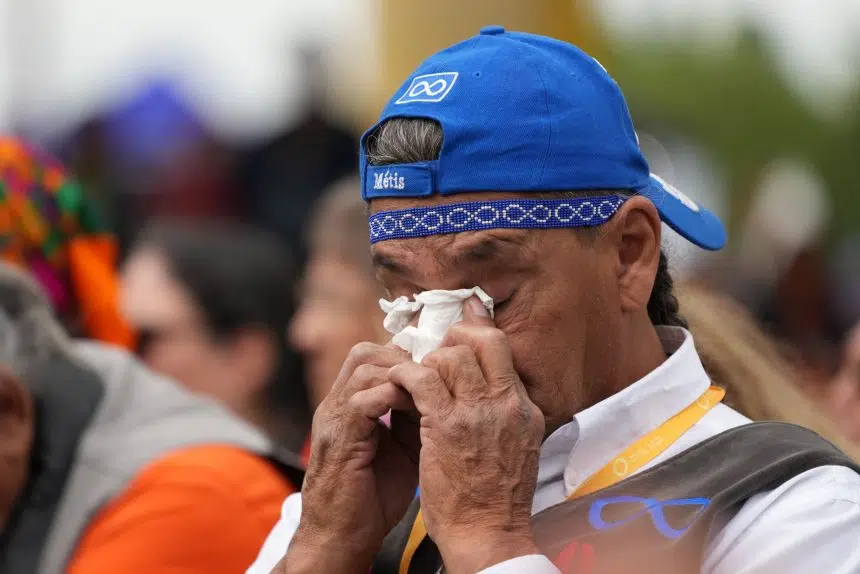Chief Bobby Cameron of the Federation of Sovereign Indigenous Nations (FSIN) said Indigenous communities will “of course” accept the apology issued to Indigenous peoples by Pope Francis on Monday.
The pontiff was at the site of a former residential school in Maskwacis, Alta., where he apologized for the Catholic church’s role in residential schools in Canada.
“It’s part of the healing journey,” Cameron said later Monday.
Also part of that journey were some First Nations and residential school survivors who made the trip to see the Pope in Edmonton.
“We support those who are going there to hear the apology as it is part of the healing journey,” Cameron said.
Saskatoon’s Sandi Harper was among those who travelled to hear the Pope’s apology.
“This is a step towards healing for many people who are suffering and who are in pain, so I think this is one of the biggest steps toward reconciliation,” Harper told The Canadian Press.

Indigenous people bow their heads after Pope Francis delivered his apology to Indigenous people for the church’s role in residential schools during a ceremony in Maskwacis, Alta., as part of his papal visit across Canada on Monday, July 25, 2022. THE CANADIAN PRESS/Nathan Denette
It’s a “pretty historic event, without a doubt,” Cameron said, but he noted he wants action more than words.
Some of the action items Cameron would like to see include removing and dissolving the doctrine of discovery, bringing those responsible for death and abuse to justice and holding them to account, and restoring and returning artifacts to First Nations and survivors.
“This is a part of Canada’s history and it will never be forgotten,” Cameron said. “It is a history that many First Nations have endured and we’re still dealing with intergenerational trauma.”
Saskatoon Tribal Council Chief Mark Arcand reacted positively to Pope Francis’ words.
“(The Pope) did say he was deeply sorry so I understand that people that went to residential schools, (the) majority are in support of the apology,” Arcand said.
“It’s something they haven’t heard in a very, very long time that’s destroyed First Nations people’s lives.”
Arcand understands that some First Nations people had no interest in attending the ceremony. He says that’s their right.
“There is still some survivors that choose not to want to hear it and that’s their right and their empowerment,” he said. “But there has got to be a sense of healing and that investment to move forward to actually help deal with the trauma (for) moving forward from this announcement.”
Arcand says it’s very meaningful that the purpose of the Pope’s trip to Canada was to address residential schools.
“I think it’s a historic day in Canada, this being for Indigenous people to admit the wrongs of residential schools which is a meaningful statement,” Arcand said.
Arcand said this is just a start in the healing process and there’s still plenty of work to do.
“At the same time, there’s intergenerational people that have been affected and these are things we got to work on,” Arcand said.
“When you see people still traumatized at 60, 70, and 80 years old, it’s going to take a lot of investment to correct the wrongs and I think this is a good start in the right direction for reconciliation moving forward.”
After the event in Maskwacis, George Arcand Jr. — the Grand Chief of the Confederacy of Treaty Six First Nations, which stretches from Alberta across Saskatchewan — was among First Nations dignitaries to react to the Pope’s speech.
Arcand Jr., thanked the pontiff for his apology, calling it “a gift to many.”
“The wrongs of the past need to righted,” said Arcand Jr. “I see Pope Francis’ apology today as only the first step in the church making amends with our people.
“After meeting with the pope and hearing his words today, I believe there is a path forward together. There is a lot of work to be done. The system within the church needs to be unlearned. I have faith this can be done, I know it can be done, we’ve been doing this for a long time.”
Arcand Jr. noted he’s hopeful that Pope Francis can be the vehicle for change for the Catholic church during the reconciliation process.
“I’m hopeful the Government of Canada and the church will work with us to find a path forward,” said Arcand Jr. “As of today, we have no agreement or commitment by the church of Government of Canada to move things forward. We hope and pray that by the end of tomorrow when people in the world understand our plea, that the Government of Canada and church will reach out their hand and say, ‘Let’s get serious. Let’s do something that matters.’ ”
— With files from The Canadian Press, 650 CKOM’s Libby Giesbrecht, 650 CKOM’s Dallas Dahlseide and 980 CJME’s Shane Clausing







